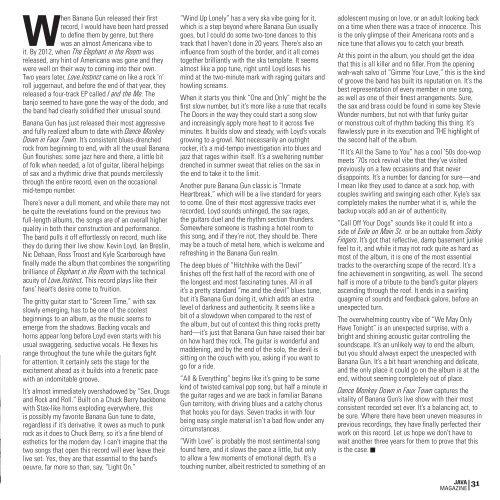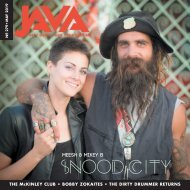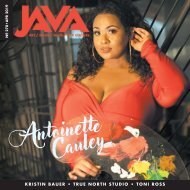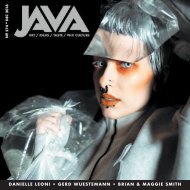You also want an ePaper? Increase the reach of your titles
YUMPU automatically turns print PDFs into web optimized ePapers that Google loves.
When Banana Gun released their first<br />
record, I would have been hard pressed<br />
to define them by genre, but there<br />
was an almost Americana vibe to<br />
it. By 2012, when The Elephant in the Room was<br />
released, any hint of Americana was gone and they<br />
were well on their way to coming into their own.<br />
Two years later, Love.Instinct came on like a rock ’n’<br />
roll juggernaut, and before the end of that year, they<br />
released a four-track EP called I and the Me. The<br />
banjo seemed to have gone the way of the dodo, and<br />
the band had clearly solidified their unusual sound.<br />
Banana Gun has just released their most aggressive<br />
and fully realized album to date with Dance Monkey<br />
Down in Faux Town. It’s consistent blues-drenched<br />
rock from beginning to end, with all the usual Banana<br />
Gun flourishes: some jazz here and there, a little bit<br />
of folk when needed, a lot of guitar, liberal helpings<br />
of sax and a rhythmic drive that pounds mercilessly<br />
through the entire record, even on the occasional<br />
mid-tempo number.<br />
There’s never a dull moment, and while there may not<br />
be quite the revelations found on the previous two<br />
full-length albums, the songs are of an overall higher<br />
quality in both their construction and performance.<br />
The band pulls it off effortlessly on record, much like<br />
they do during their live show. Kevin Loyd, Ian Breslin,<br />
Nic Dehaan, Ross Troost and Kyle Scarborough have<br />
finally made the album that combines the songwriting<br />
brilliance of Elephant in the Room with the technical<br />
acuity of Love.Instinct. This record plays like their<br />
fans’ heart’s desire come to fruition.<br />
The gritty guitar start to “Screen Time,” with sax<br />
slowly emerging, has to be one of the coolest<br />
beginnings to an album, as the music seems to<br />
emerge from the shadows. Backing vocals and<br />
horns appear long before Loyd even starts with his<br />
usual swaggering, seductive vocals. He flexes his<br />
range throughout the tune while the guitars fight<br />
for attention. It certainly sets the stage for the<br />
excitement ahead as it builds into a frenetic pace<br />
with an indomitable groove.<br />
It’s almost immediately overshadowed by “Sex, Drugs<br />
and Rock and Roll.” Built on a Chuck Berry backbone<br />
with Stax-like horns exploding everywhere, this<br />
is possibly my favorite Banana Gun tune to date,<br />
regardless if it’s derivative. It owes as much to punk<br />
rock as it does to Chuck Berry, so it’s a fine blend of<br />
esthetics for the modern day. I can’t imagine that the<br />
two songs that open this record will ever leave their<br />
live set. Yes, they are that essential to the band’s<br />
oeuvre, far more so than, say, “Light On.”<br />
“Wind Up Lonely” has a very ska vibe going for it,<br />
which is a step beyond where Banana Gun usually<br />
goes, but I could do some two-tone dances to this<br />
track that I haven’t done in 20 years. There’s also an<br />
influence from south of the border, and it all comes<br />
together brilliantly with the ska template. It seems<br />
almost like a pop tune, right until Loyd loses his<br />
mind at the two-minute mark with raging guitars and<br />
howling screams.<br />
When it starts you think “One and Only” might be the<br />
first slow number, but it’s more like a ruse that recalls<br />
The Doors in the way they could start a song slow<br />
and increasingly apply more heat to it across five<br />
minutes. It builds slow and steady, with Loyd’s vocals<br />
growing to a growl. Not necessarily an outright<br />
rocker, it’s a mid-tempo investigation into blues and<br />
jazz that rages within itself. It’s a sweltering number<br />
drenched in summer sweat that relies on the sax in<br />
the end to take it to the limit.<br />
Another pure Banana Gun classic is “Inmate<br />
Heartbreak,” which will be a live standard for years<br />
to come. One of their most aggressive tracks ever<br />
recorded, Loyd sounds unhinged, the sax rages,<br />
the guitars duel and the rhythm section thunders.<br />
Somewhere someone is trashing a hotel room to<br />
this song, and if they’re not, they should be. There<br />
may be a touch of metal here, which is welcome and<br />
refreshing in the Banana Gun realm.<br />
The deep blues of “Hitchhike with the Devil”<br />
finishes off the first half of the record with one of<br />
the longest and most fascinating tunes. All in all<br />
it’s a pretty standard “me and the devil” blues tune,<br />
but it’s Banana Gun doing it, which adds an extra<br />
level of darkness and authenticity. It seems like a<br />
bit of a slowdown when compared to the rest of<br />
the album, but out of context this thing rocks pretty<br />
hard—it’s just that Banana Gun have raised their bar<br />
on how hard they rock. The guitar is wonderful and<br />
maddening, and by the end of the solo, the devil is<br />
sitting on the couch with you, asking if you want to<br />
go for a ride.<br />
“All & Everything” begins like it’s going to be some<br />
kind of twisted carnival pop song, but half a minute in<br />
the guitar rages and we are back in familiar Banana<br />
Gun territory, with driving blues and a catchy chorus<br />
that hooks you for days. Seven tracks in with four<br />
being easy single material isn’t a bad flow under any<br />
circumstances.<br />
“With Love” is probably the most sentimental song<br />
found here, and it slows the pace a little, but only<br />
to allow a few moments of emotional depth. It’s a<br />
touching number, albeit restricted to something of an<br />
adolescent musing on love, or an adult looking back<br />
on a time when there was a trace of innocence. This<br />
is the only glimpse of their Americana roots and a<br />
nice tune that allows you to catch your breath.<br />
At this point in the album, you should get the idea<br />
that this is all killer and no filler. From the opening<br />
wah-wah salvo of “Gimme Your Love,” this is the kind<br />
of groove the band has built its reputation on. It’s the<br />
best representation of every member in one song,<br />
as well as one of their finest arrangements. Sure,<br />
the sax and brass could be found in some key Stevie<br />
Wonder numbers, but not with that funky guitar<br />
or monstrous cult of rhythm backing this thing. It’s<br />
flawlessly pure in its execution and THE highlight of<br />
the second half of the album.<br />
“If It’s All the Same to You” has a cool ’50s doo-wop<br />
meets ’70s rock revival vibe that they’ve visited<br />
previously on a few occasions and that never<br />
disappoints. It’s a number for dancing for sure—and<br />
I mean like they used to dance at a sock hop, with<br />
couples swirling and swinging each other. Kyle’s sax<br />
completely makes the number what it is, while the<br />
backup vocals add an air of authenticity.<br />
“Call Off Your Dogs” sounds like it could fit into a<br />
side of Exile on Main St. or be an outtake from Sticky<br />
Fingers. It’s got that reflective, damp basement junkie<br />
feel to it, and while it may not rock quite as hard as<br />
most of the album, it is one of the most essential<br />
tracks to the overarching scope of the record. It’s a<br />
fine achievement in songwriting, as well. The second<br />
half is more of a tribute to the band’s guitar players<br />
ascending through the roof. It ends in a swirling<br />
quagmire of sounds and feedback galore, before an<br />
unexpected turn.<br />
The overwhelming country vibe of “We May Only<br />
Have Tonight” is an unexpected surprise, with a<br />
bright and shining acoustic guitar controlling the<br />
soundscape. It’s an unlikely way to end the album,<br />
but you should always expect the unexpected with<br />
Banana Gun. It’s a bit heart wrenching and delicate,<br />
and the only place it could go on the album is at the<br />
end, without seeming completely out of place.<br />
Dance Monkey Down in Faux Town captures the<br />
vitality of Banana Gun’s live show with their most<br />
consistent recorded set ever. It’s a balancing act, to<br />
be sure. Where there have been uneven measures in<br />
previous recordings, they have finally perfected their<br />
work on this record. Let us hope we don’t have to<br />
wait another three years for them to prove that this<br />
is the case.<br />
JAVA 31<br />
MAGAZINE


















